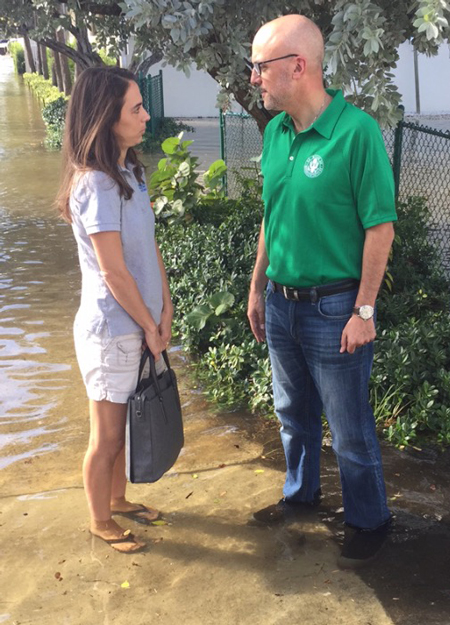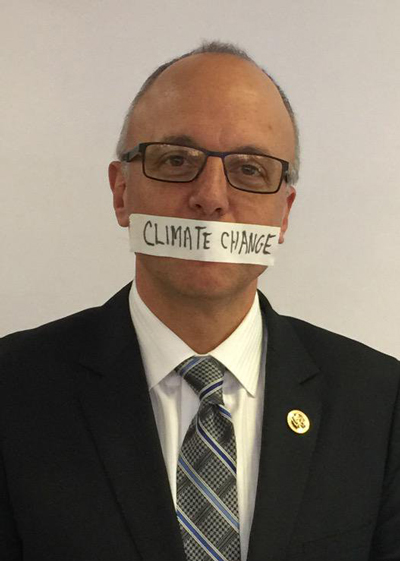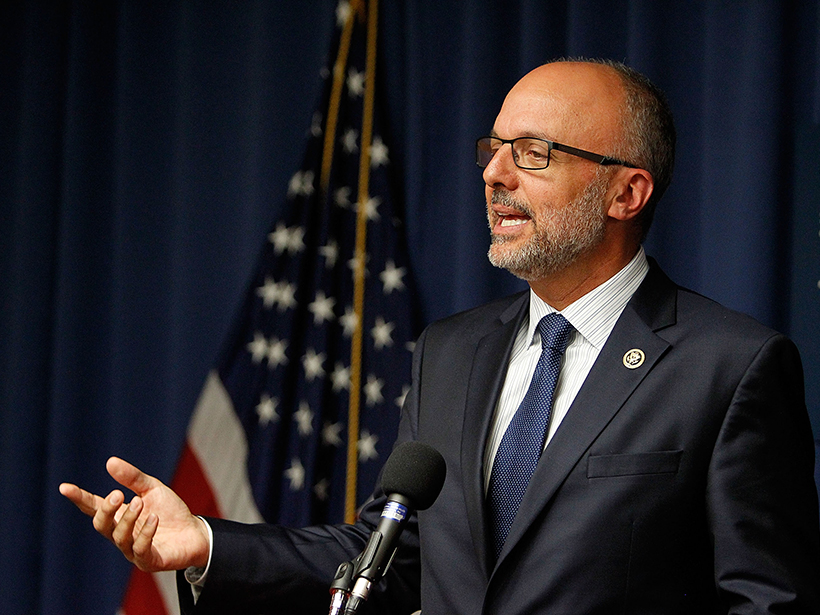For congressman Ted Deutch, a Democrat who represents part of southern Florida in the U.S. House of Representatives, there is no time to waste in dealing with climate change. The effects of climate change, Deutch warns, threaten our national security, our economy, our health, and our daily livelihoods. And it’s an urgent social, political, and personal issue that he sees is hitting his low-lying state hard.
Since his election in 2010 to represent Florida’s 22nd district, Deutch has been on the forefront of congressional efforts to combat climate change. He cochairs the House’s bipartisan Climate Solutions Caucus, a group that he cofounded in 2016 with Rep. Carlos Curbelo (R-Fla.) to explore policy options that address climate change. That group currently has 90 members, with Democrats and Republicans represented equally.
Deutch, 52, also is the likely next chair of the House Committee on Ethics, if an anticipated “blue wave” during the upcoming 6 November midterm elections allows the Democrats to gain a majority in the House. Deutch currently is the ranking Democrat on the ethics committee.
His work and insights on the legislative sides of climate change and ethics offer a window into congressional efforts to move forward on dealing with climate change in the current political climate. With President Donald Trump’s pledge to withdraw the United States from the Paris climate accord and calling climate change “a hoax,” Deutch and others who are concerned about the issue face a tough fight.
Eos recently spoke with Rep. Deutch about the urgency to act on climate change and about the Climate Solutions Caucus, climate legislation priorities, dark money in politics, and his personal concerns about the environment.
This interview has been condensed and lightly edited for flow and grammar.
Eos: You have called climate change the greatest challenge in our lifetime and said that we must act now to prevent irreversible damage. Why do you think that’s the case?
“We must recognize that we’ve got to face climate change at this moment and that we have to face it with urgency.”
Deutch: We are seeing the effects of human contributions to climate change now playing out, right in front of our eyes. Unless we take action now, these effects will simply be the start of a downward spiral. The impact of that on our environment, on our quality of life, on our economy would be so severe. We must recognize that we’ve got to face climate change at this moment and that we have to face it with urgency.
Eos: What is your reaction to the Intergovernmental Panel on Climate Change’s 8 October report that says that the world has until 2030 to cut carbon emissions by 45% before temperatures rise 1.5°C above preindustrial levels? The report also concludes that if emissions are not reduced, the current trajectory positions us for far higher temperatures by the end of the century.
Deutch: The trajectory, they point out, is 3°C–4°C worldwide, which is unlivable. The report rightly talks about dramatically increasing the share of the primary energy we use from renewables to have any chance at reducing that increase.
The findings are terribly troubling, but they just confirm what we’ve known for a long time: We’re not doing enough to reduce carbon emissions, and we have to move more quickly toward clean fuels.
This is urgent. It’s urgent especially for a state like mine. The urgency expressed in that report is something that we can’t move away from. It needs to help guide the policy decisions that we make.

Eos: I understand that you recently toured an area of Fort Lauderdale hit hardest by king tide. What was that like?
Deutch: In southern Florida, we’re seeing the impact of climate change on sea level rise. That plays out most dramatically every year during king tide, which is the highest tide of the year. This morning, I met with a business owner in Fort Lauderdale whose salon faces rising waters, and as a result, there are periods when people can’t come through the front door.
It’s just powerful to speak to people for whom climate change isn’t some concept of a far-off impact but something that they’re feeling right now.
Eos: Given sea level rise, extreme weather, national security implications, and other concerns related to climate change, what do you say to people who dismiss the need for action now because they think that climate change is some event in the distant future?
Deutch: It’s just a matter of helping people to understand and be willing to acknowledge that this isn’t all just a big coincidence, that these things [sea level rise, severe weather, and other phenomena] are happening all at the same time, and that climate change is causing these changes.
Eos: How do you approach people who don’t believe in the scientific consensus that humans are changing climate?
“Climate change is an issue that we have to tackle together. Those who continue to refuse to do it are going to have their voices become less and less relevant.”
Deutch: The example for the country, as set in southern Florida, is that climate change is an issue that we have to tackle together. Those who continue to refuse to do it are going to have their voices become less and less relevant. That’s how we find ways to go forward.
Eos: Why are you the cofounder and cochair of the Climate Solutions Caucus?
Deutch: In southern Florida, climate change is an issue that’s not partisan and that’s not distant. It is here now, and the local community is dealing with it. Local government officials—Democrats and Republicans alike—and the local business community from small business owners to CEOs of some of our large corporations all are working together to find ways to invest in resilience, to work together to put a regional plan in place.
Coming from here, it was frustrating that in Washington climate change is too often viewed through a partisan lens. So Rep. Curbelo and I started the Climate Solutions Caucus, working with our friends in the Citizens’ Climate Lobby and some other groups, for the purpose of bringing people together to talk about these issues and to hear from experts.
Eos: How has the caucus advanced the conversation? I understand, for instance, that the caucus played a key role regarding the 2017 National Defense Authorization Act (NDAA).
Deutch: There was an effort to essentially eliminate from the Defense Authorization Act any reference to climate change and its impact on our national security. In that case, we were able to come together, and the majority of members of the caucus helped to defeat that amendment.
“We were not unified enough when the president pulled out of the Paris accord. There was more that we should have done.”
There is a whole lot more that we need to do. We’ve not been unified enough for me. We were not unified enough when the president pulled out of the Paris accord. There was more that we should have done. I think that there is more that we can do through legislation. But being able to at least stop the proposed NDAA amendment from going forward was a first step.
Also, getting people to sit around a table and listen to experts talk about the impact of climate change on our economy—and, frankly, the opportunities for economic growth that arise out of the many things we can do to combat it—is, I think, a positive step.
Eos: I understand that the caucus is developing bipartisan climate legislation.
Deutch: My hope is that we will be able get to a serious effort to pass a carbon fee bill, something that will both help to change behavior and bring Democrats and Republicans together. Because it’s a bipartisan idea, we ought to be able to approach it in a bipartisan way.
Eos: What do you mean by a carbon fee program?
Deutch: It’s a rebate program, so that people who produce carbon will pay a fee for it and then that money will be rebated to consumers throughout the country to help create economic growth that way.
My hope was that we could have a bipartisan bill to introduce even before the end of this Congress, and I’ve not given up on that hope, understanding that there is going to be an election before we go back to Washington. But we will be back in November and December before this Congress ends [on 3 January 2019]. I’d like to get something on the table just as a starting point for further bipartisan efforts.
Eos: Would a carbon fee be the key point of the bipartisan legislation?
Deutch: Yes. I think putting a price on carbon and having a carbon fee with a rebate is the best way to generate bipartisan support.
In the meantime, there are lots of other issues, lots of other proposals about energy efficiency and further encouraging green energy at both the macro level and for the individual homeowner. There are a lot of ideas that hopefully we’ll be building into a legislative agenda. That’s an agenda that’s probably going to have to wait until the start of the next Congress, however.
Eos: How do you respond to criticism that some House members are trying to greenwash their image—for example, saying that they care about climate change by being part of the caucus but then not having very good voting records on environmental issues?
Deutch: I don’t really buy the greenwashing. There may be members who attempt to hide a bad voting record on climate and the environment by claiming membership in this caucus. But people are ultimately going to be judged by what they do, not just by what they say. And I want them sitting at the table to hear from these experts so that perhaps they’ll be willing to do more.
“People are tired of Washington refusing to approach issues using common sense, particularly given what’s at stake.”
Eos: Do you think that bipartisan efforts are the most effective ways to move forward with climate solutions, or would partisan efforts by House Democrats, if they win the House in the mid-term elections, be more effective?
Deutch: I think people are tired of Washington refusing to approach issues using common sense, particularly given what’s at stake.
I always think that if we could do something in a bipartisan way, that’s the best way to effect lasting change. We’re going to continue to push that. At the same time, I want the outside groups to increase the pressure as much as needed to get my colleagues to understand that there needs to be action as well, that they need to step up, they need to vote the right way, they have to speak out.
So it’s a combination. I want this caucus to have a broad membership, with people who might not otherwise be part of the debate sitting at the table, but then I want them to also do the right thing as a member of Congress and support efforts to combat climate change.
Eos: If many moderate Republicans lose their seats in the mid-term elections, what would that mean for the caucus?
Deutch: We will just have to take a look at what the caucus looks like and figure out how to reconstitute it in a way that will ensure that we can continue to have a bipartisan conversation. We’ll do that in the next Congress with the ability to take the next step, which is to not just talk but to pursue action on climate change that can help point Congress in a new and better direction.

Eos: After the election, what will be the first priority on climate change?
Deutch: I’m not prepared to point to a single piece of legislation that needs to pass. The first action that we need to take is to ensure that climate change is on the agenda, that it is part of the debate, and that it is seen for what it is: an urgent threat to the future of our economy, of our country, and of our world. If we can accomplish that, it will be easier to highlight the work the private sector is doing and to finally get the government to do the job that it needs to do to turn back some of the dangerous policies that we’ve seen coming from this administration.
Eos: In addition to putting a price on carbon and promoting green energy and energy efficiency, what are other legislative priorities? I know you’ve talked about infrastructure resilience as climate warms.
Deutch: If the Democrats take back the House, we are going to put forth an infrastructure package that will help generate economic activity and will do all the things that we have traditionally talked about when we view our aging infrastructure. But we have to make sure that those investments in infrastructure include strong investments in making sure that we have resilient infrastructure. The whole idea of resilience matters enormously now.
Among all of the things that we can do, keeping climate change and the impact of climate change as central parts of any infrastructure plan is, I think, what can be the most effective right now.
“One of the reasons that we haven’t seen action on climate change is that the biggest polluters use their money to influence the politicians who will be casting votes.”
Eos: You have spoken out against hard-to-trace dark money in the political process. You are also a sponsor of the Democracy for All Amendment to the Constitution to counter the Supreme Court’s 2010 Citizens United decision, which led to unprecedented political spending. What is the connection between dark money and climate change action, and how concerned are you?
Deutch: I’m very concerned. One of the reasons that we haven’t seen action on climate change is that the biggest polluters use their money to influence the politicians who will be casting votes. They are using their money to try to safeguard their business interests. They refuse to acknowledge the impact that they are having on climate change and, ultimately, on our economy. They spend enormous sums—unlimited money—to protect these polluting businesses.
We’ve got to break that lock that some of these groups have on too many members of the House and the Senate. Trying to get big money out of politics and eliminating dark money are the best ways we can do that.
Eos: Is there any traction on the Democracy for All Amendment?
Deutch: There is a lot of traction in America. There’s more and more traction in Washington, and I think you’ll see a return to this issue as part of a broader accountability agenda that we hope to roll out in January.
Eos: Why are you personally so concerned about climate change?
Deutch: The data are clear; the stories that we read are compelling. When you see it firsthand, as we do in Florida, when you see the severity of the storms increase, when you know that the algae blooms that we’re dealing with are worse when the water temperature is higher and you see water in the streets as a result of sea level rise, you feel that you have to act.
“There is no time to waste.”
In my case, its personal because I’m a parent. My wife and I have three kids. When we talk about what’s going to happen over the next 20 years, 30 years, and 50 years, the impacts will affect them and their children. I want the decisions that they make about where they live and what they pursue and how they enjoy life to be driven by their desires and not by the necessary ways to avoid the impact of climate change.
That’s the way I think about it. I’ve had the privilege over the past couple of years, especially through the caucus, to talk to so many people who have seen their lives impacted dramatically already. For them, for our kids, and for future generations, there is no time to waste.
—Randy Showstack (@RandyShowstack), Staff Writer
Citation:
Showstack, R. (2018), Congressman on a climate change mission, Eos, 99, https://doi.org/10.1029/2018EO108369. Published on 25 October 2018.
Text © 2018. The authors. CC BY-NC-ND 3.0
Except where otherwise noted, images are subject to copyright. Any reuse without express permission from the copyright owner is prohibited.

